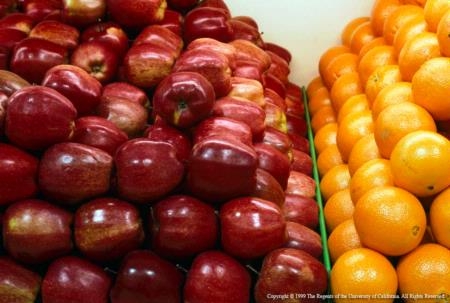
Posts Tagged: holidays
Beyond New Year's resolutions: tips for good health
Oh January 1st, how I hate you. If you’re like me you’re still recovering from the month long holiday food hangover. With three months until spring and swimsuit season on the horizon, you’re feeling the pressure to lose the winter coat! As always, you make that infamous New Year’s resolution: TO LOSE WEIGHT!

“Gym membership here I come!”
“I will not touch another carb for the rest of the year!”
“No sweets ever again… after this one!”
“I’m on a new diet, I eat nothing and when I feel like I’m going to faint I eat a cube of cheese!”
Okay the last one is my favorite quote from the Devil Wear’s Prada, but working in the health field I have found that sometimes people actually think that’s a solution. We find ourselves making resolutions that eliminate entire food groups from our diets, because we think it will help us lose weight. The thing most people don’t know or realize is that sometimes the absolutes we make can be very harmful to our health, and in the long run can actually cause us to gain the weight back plus more.
So this year, let’s make an attainable, realistic goal. Here are three tips selected from www.choosemyplate.gov, to have a healthy year!
- Put a positive spin on it – instead of saying “I can’t eat any sweets at all!” try a few “I will” statements on for size:
- I will add 1 serving of fruits and vegetables to each meal.
- I will make half of my grains whole.
- I will choose water or low-fat milk more often.
- Build a healthy snack – instead of buying the expensive processed snacks, try these healthy tips:
 Fruit makes a great snack
Fruit makes a great snack
Combine fruit and a dairy food for the morning munchies:
- Apple and cheese
- Banana and yogurt
Combine vegetables and a protein food for a p.m. pick-me-up:
- Celery and peanut butter
- Carrots and almonds
Combining these foods will help you stay fuller longer while increasing your nutrient consumption.
- Don’t discount physical activity – being healthy isn’t about just what you eat. Adults need 30 minutes of physical activity a day and children need 60 minutes. Just because you don’t have a gym membership doesn’t mean you can’t be physically active. Remember that 30 minutes can be broken up throughout the day.
Here are some tips to increase your physical activity incrementally, without breaking the bank:
- Start a walking club with your co-workers, neighbors or friends. You’re more likely to do it if someone keeps you accountable.
- Do what you like! If you hate to run, don’t do it. There’s no use in driving yourself crazy doing something you hate. If you like to dance, then turn the radio up and have fun!
- Do stretches, exercises, or pedal a stationary bike while watching television.
Remember to always consult your physician before beginning a rigorous exercise regimen.
May your new year be full of realistic, attainable, resolutions! Keep it positive. Select healthy snacks that help you stay full longer. Get moving so you have more energy during the day. For more information and health tips visit www.choosemyplate.gov.
Wishing you all a very healthy 2012!
The party's ova
Spring is a big time of year for celebrating with a very cheap (cheep?), common, protein-rich food: the chicken egg. And because the hard-boiled egg has a special place at the Seder table and an important role in Easter morning hunts and afternoon picnics, eggs right now are selling like hotcakes. Problem is, the more eggs your market sells, the more likely you are to get them extra fresh, and consequently, the more trouble you're likely to have getting the things to peel when it's time to eat them up.
Chemistry is at the root of the egg-peeling problem: a newly laid egg has a slightly lower, more acidic pH value than the raw egg that you've stored in the refrigerator for a few days. The higher pH of the stored egg allows its white to cling less firmly to the membrane just inside the shell once it is cooked, and less cling means you can get the shell off more cleanly and easily. If you managed to plan ahead and get your eggs five or more days ahead of time this year, good for you! If you didn't, well, better luck next time. Clean-peeling or not, they'll still taste great.
There's a whole lot more to know about eggs than you might imagine—like whether you should wash eggs before you put them in the fridge (you shouldn't), what's the best way to store eggs in the fridge if you want them to last (pointy end down), and whether the refrigerator door egg rack was really such a great invention after all (it wasn't)—and a fun way to learn more is to visit a 4-H Avian Bowl competition at your local County Fair or other 4-H event.
Thanks to the guidance and commitment of UC Extension Poultry Specialist Francine Bradley, California 4-H teams have been doing very well lately in the Avian Bowl, winning first place in the national competition in eight out of the last ten years.
So next time you have a question about eggs or chickens, go find a 4-Her. Just don't ask them which came first. They get that a lot.

brown eggs in the straw
10 tips for navigating 'national eating season'

- Make yourself a “health calendar.” Map out your food choices each week and schedule regular exercise. The calendar can help you prepare for a proliferation of parties and survive the Halloween-to-Super Bowl “national eating season,” said Gigliotti, a registered dietitian. “The best four-letter word to use is plan. Stop, take a deep breath and anticipate the situation.”
- Establish a calorie budget – the number of calories you can consume per day and maintain your current weight. “Look at high-calorie days and have a plan to offset those,” Gigliotti said.
- Exercise. Every bit helps. Walk up stairs or around the block. Try to get a total of 30 minutes a day.
- Get enough sleep. People who are sleep-deprived are more prone to overeat, Gigliotti said.
- Arrive satisfied. “Plan for meals and snacks throughout the day prior to an event, so you’re having something – ideally low calorie like fruit or vegetables – every three hours,” Gigliotti said. “Don’t starve yourself throughout the day. That’s a setup to overconsume calories.”
- Decide what foods are important to have. “I never would eat bread or a roll at a Thanksgiving dinner,” Gigliotti said. “I’m not going to waste my calories on that. Now stuffing we only make once a year. We’re going to have that and enjoy it.”
- Drink slim. Alcoholic drinks can pack calories without filling you up. Consider a club soda with a twist of lime. “If you have something in your hands, people are less likely to push food on you,” Gigliotti said.
- Be creative. Instead of a cookie exchange, Gigliotti does a soup exchange with friends, providing low-calorie meals for days.
- Practice “environmental control.” Buy smaller quantities of items and don’t put out fattening items at home or at work. “If it’s there, we’ll eat it,” Gigliotti said.
- If you do overindulge, don’t get discouraged. Compensate by reducing your caloric intake for a few days. “Look at the big picture,” Gigliotti said. “Have a healthy relationship with food choices.”
What are your best suggestions for battling the holiday bulge? For more tips, view UC Cooperative Extension advisor Brenda Roche’s Food Blog post and these other UC sites:
Eat, drink and be merry this holiday season…and pay for it later?

Well, according to research published in the August issue of Nutrition & Metabolism, we could see the ill effects of our short-term holiday indiscretions for years to come. The researchers had 18 subjects increase their calorie intake by 70 percent over a 4-week period of time and limit their physical activity to less than 5,000 steps per day. Does this sound like the all-too-familiar Thanksgiving through New Year's free-for-all to you? Not surprisingly, the subjects gained, on average, 14 pounds during this short-term intervention period. Six-months later, most of them lost weight. The startling results were discovered, however, at the one-year and 2 ½-year follow-ups. The intervention participants had increased body weight and fat mass compared to their baseline measurements. More telling is the fact that the control group – the participants who didn’t go on the four-week eating binge at the beginning of the study - did not experience any weight gain after 2 ½ years. The researchers have left us wondering whether over-eating in the short-term can have lasting effects on our waistlines for years to come.
Clearly, more research is necessary in this area, but before you go spending the entire month of December throwing sensible eating habits and physical activity to the wind, you might want to think twice!
Tips to stay healthy during the holiday season:
Don’t give yourself a “pass” for the month of December. It’s important to keep portion sizes in check and to limit foods that are high in added fat, sugar and salt. It’s also important to maintain your regular physical activity routine. If you’ve been meaning to incorporate more physical activity into your daily routine, no need to wait until Jan. 1 to start. Now is as good a time as ever to get moving. Exercise can help alleviate some of the added stress brought on by the holidays and boost your holiday cheer through the exercise-induced endorphins.
The USDA offers a number of healthy recipes and tips on the SNAP-ED Connection website to help get you through this merry season unscathed by traditional holiday fare.
Do you live in the LA area? Join LA County Cooperative Extension on Friday, Dec. 10 to get great tips on how to have a healthy holiday season. The general public is invited to attend and will learn about healthier options to traditional holiday recipes, ways to stay active during the holiday season, and how to make healthy choices during a time when many of our budgets are stretched to the limit.
For more information about this event, please contact Los Angeles County Nutrition, Family & Consumer Sciences Advisor Brenda Roche at bkroche@ucdavis.edu (323-260-3299) or visit our website calendar for more information.

Don't over induldge, even during the holidays.
Holiday food safety

As the holiday season approaches, we begin to think about spending time with our families, enjoying one another’s company over the many feasts that accompany special days. While we may set aside mindful eating during the holiday season, we should not set aside food safety.
In many families, once the holiday meal is served it may sit on the table for 2-3 hours while people come and go, “picking” from the various serving dishes. The most creative food safety flub goes to a family member who thaws her holiday turkey in her garage. Her justification of this practice? “I haven’t hurt anyone yet!”
With respect for time-honored traditions, might we suggest that this festive time of giving and sharing SHOULD NOT include sharing foodborne illness by forgetting food safety measures? In many California counties, we may still have some heat lingering late into the November month. How much harm can the garage thawing method, or “GTM” if you will, really have? After all, we will be cooking it appropriately right? Wrong!
A few turkey thawing tips:
- If thawing your turkey in the refrigerator; plan for 24 hours per 4-5 pounds of turkey.
- Place the turkey into a container to avoid contaminating other foods.
- If thawing your turkey in cold water; plan for 30 minutes per 1 pound of turkey. Remember to change the water every 30 minutes.
- If thawing your turkey in the microwave; follow the manufacturer guidelines.

- A turkey thawed in cold water or in the microwave must be cooked immediately.
(Photo: USDA)
Cooking your turkey properly ensures that all harmful bacteria have been destroyed.
Cooking time ranges from 2¾ hours to 5¼ hours depending on size and whether the turkey is stuffed. To check the temperature of a properly cooked turkey, one should insert the thermometer into the innermost part of the thigh and wing as well as the thickest part of the breast; proper temperature should read 165 degrees. Once all parts have reached this minimum temperature, it is safe to eat, even if parts should remain pink. Stuffing should read 165 degrees when properly cooked as well.
Here are a few tips to keep your foods safe when storing leftovers:
- Cut turkey or other meats into smaller pieces. Store stuffing separately.
- Divide large quantities of food items into smaller portions before storing.
- Store different food items separately.
- Turkey that is stored in the refrigerator can be held for 3-4 days; reheat to 165 degrees.
- Frozen turkey can be stored for 2-6 months; reheat to 165 degrees.
Enjoy your holiday feast and be sure to keep your foods safe!
These tips and more can be found at http://www.fsis.usda.gov/.
Blog contributors: Connie Schneider, Ph.D., R.D., Laurin Herrera, CSUF Dietetic Intern, & Shelby MacNab, Nutrition Program Manager

